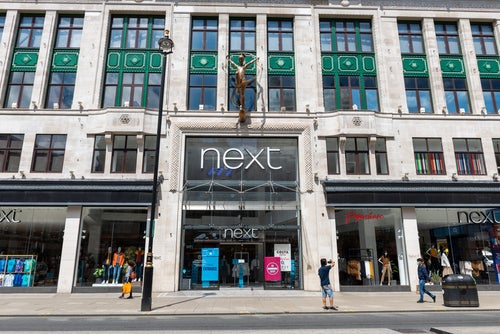
Reporting its results for the 13 weeks to 30 April, Next said its full-price sales rise was in line with its guidance for the period.
Retail sales surged by 285%, up against a weak comparative in the prior year when the majority of Next’s retail stores were shut amid the Covid-19 pandemic.

Discover B2B Marketing That Performs
Combine business intelligence and editorial excellence to reach engaged professionals across 36 leading media platforms.
Conversely, online sales were boosted last year by retail closures. Total online sales were down 11% year-on-year in light of this in the current quarter. Online sales against three years ago remained strong and were up 47% versus 2019/20, Next highlighted.
Looking ahead, Next said its guidance for sales and profit before tax remains unchanged from that given in its year-end results in March.
Central guidance expects a 5% rise in full-year full-price sales versus 2021/22 and pre-tax profit to come in at GBP850m (US$1.07bn), which would be up 3.3% versus last year.
A strong cross-brand and department store-style offering
GlobalData apparel analyst Emily Salter says Next Plc had a good start to its FY2022/23 with its Label branded proposition driving the retailer’s sales.

US Tariffs are shifting - will you react or anticipate?
Don’t let policy changes catch you off guard. Stay proactive with real-time data and expert analysis.
By GlobalDataShe points out, however, that in March the company stated sales at the start of its FY2022/23 were exceeding its expectations, but this must have abated somewhat as the retailer’s guidance for the year remains unchanged.
“As the rising costs of living started to bite in April, the midmarket stands to be squeezed this year as consumers trade down and reduce their non-essential spending. However, Next is poised to prosper as its wide range of brands, including some value players such as F&F, and products, including more essential items like childrenswear, will protect it from the worst of the impacts of inflation.”
Salter adds that total online sales were down 11% year-on-year, which was driven by Next branded products (-24%) due to the switch to online experienced last year and the retailer’s already high online penetration, with total online sales an impressive 47% higher than Q1 FY2019/20.
“Conversely, retail revenue growth is massively inflated as it came up against a period of store closures last year, with sales via this channel down 8% on a three-year basis. However, this trend is to be expected, as even innovating and introducing new features in its stores cannot take away from the front-of-mind appeal that Next has built for its online proposition, especially its wide range of brands that makes it extremely convenient to purchase from.”
In some of its stores, she says, Next “increasingly resembles a department store”, with a growing number of branded areas, including Reiss and recently Gap, as well as an increased focus on homewares and beauty.
Salter points out, however, that although in some locations Next can further gain from the closure of Debenhams and John Lewis & Partners stores, there was a reason for these closures and the demise of the midmarket department store — “they are simply not needed as much because of the rise of online marketplaces, like Next itself.”
“Solid” Q1
Meanwhile, Shore Capital notes it is reassuring to see Next announce a solid trading statement.
The analysts highlight that the full price sales growth expectation for Q2-Q4 is +0.8% and is mainly driven by price increases rather than volume, which is fair given the current macro factors at play.
Eleonora Dani, equity research analyst, says: “Rising inflation and increasing costs for households continue to drive a more cautious consumer sentiment, while an eased pandemic environment accentuates the polarisation effect. Consumers are shopping for more seasonal and trend-based items, and, depending on preference, they are choosing either high-end offers or trading down. We see the Next offer particularly exposed to this trend.”
Dani concludes Next remains a “well-managed company with an experienced management team and tight stock and cost control.”





